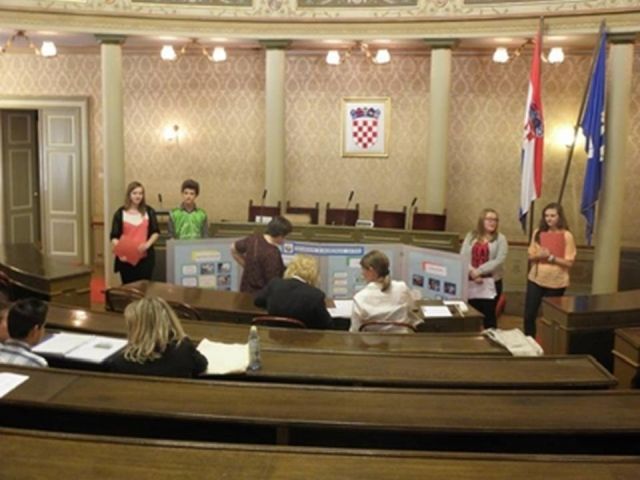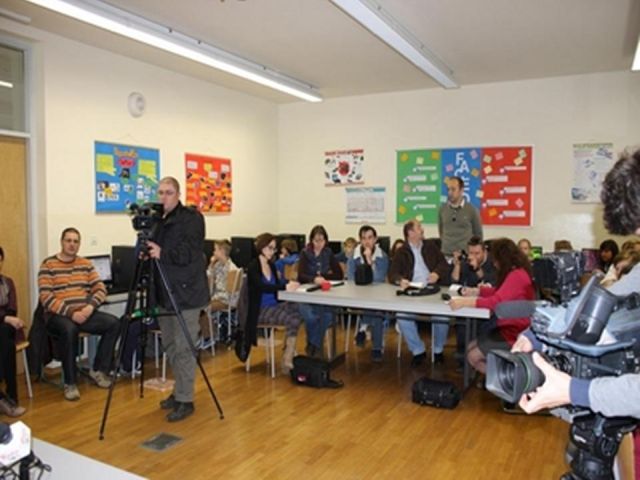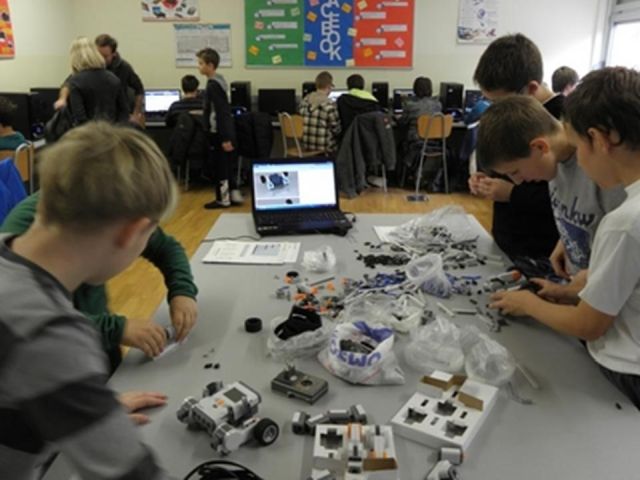Governor Mehmet Lutfullah Bilgin School
Governor Mehmet Lutfullah Bilgin Middle School is located in the center of the city. Gaziantep is a province of industry and agriculture having six industrial zones around. Because of its huge industrial zones and large numbers of factories, there is a continuous flow of people to the city. Our pupils are mainly the children of those that work for the industry. Apart from the industry and agriculture, Gaziantep is a city of culture with museums, pistachio festival and the biggest zoo in the country. The city has also been selected as the city of gastronomy by UNESCO. According to the number of pupils and education staff, it is among the biggest schools in Gaziantep. There are 75 teachers in the school who are from different branches and teach 1.600 pupils aged from 11 to 14 years. Our school has a history of 12 years and derived its name from the former governor of Gaziantep. We have a young and dynamic teaching staff that is willing to follow new educational developments, especially the digital methods at school.l. Governor Mehmet Lutfullah Bilgin Middle School has been equipped with interactive smart boards this year. There are 23 classrooms and each classroom has the chance to have a board. The school serves for pupils from the age 11 to 14 which are from 5th to 8th degrees. It is a public school and provides mixed education. Also we have an ICT lab and a lab for visual arts. There is an Astroturf in the school garden and serve for school teams. School teams in the field of football, basketball, volleyball and futsal, join the local or national tournaments and generally get high degrees. Governor Mehmet Lutfullah Bilgin Middle School has a project team which runs some local projects at the moment and run some national and one international project in the past not so far. At school, we are implementing two local projects right now. One is about the importance of hygiene while the other is about renewable energy. Through the project, we organize seminars for pupils and teachers to create awareness about renewable energy and being environment conscious. Also, we involve pupils in the recycling program of the school by teaching them how to use the recycling bins.
Umut Uysaler, Erasmus+ school coordinator, Vali Mehmet Lutfullah Bilgin Ortaokulu
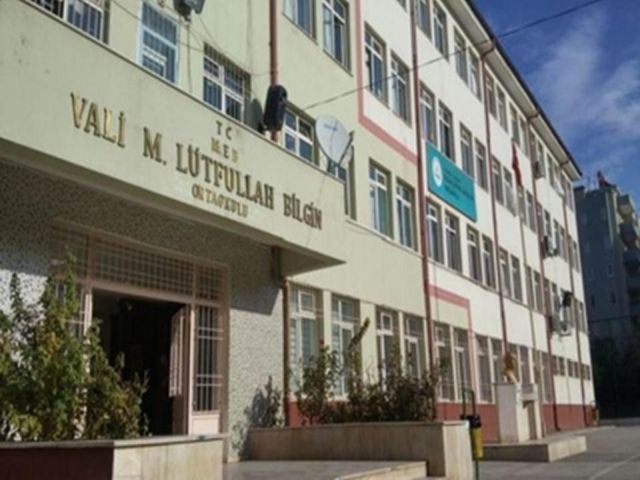
Vali Mehmet Lutfullah Bilgin Ortaokulu
Vali Mehmet Lütfullah Bilgin Ortaokulu şehir merkezinde konumlanmıştır. Gaziantep, 6 sanayi bölgesi ile ülkenin en gelişmiş endüstri merkezlerinden birisidir. Gelişmiş sanayisi ve buralarda bulunan çok sayıdaki fabrikalar dolayısıyla şehir, civar illerden çok sayıda insanı kendisine çekmektedir. Öğrencilerimizin çoğunluğunu göçle gelen sakinlerin çocukları oluşturmaktadır.Sanayi ve tarımsal kimliği dışında Gaziantep, müzeleri, festivalleri ve ülkedeki en büyük hayvanat bahçesi ile önemli bir kültür merkezidir.Ayrıca, Gaziantep, Unesco tarafından gastronomi kategorisinde, Yaratıcı Şehirler Ağı’na alınmış ve dünyanın lezzet başkenti olmuştur. Vali Lütfullah Bilgin Ortaokulu, çeşitli branşlardan 75 öğretmeni ve 11 ila 14 yaş aralığındaki 1.600 öğrencisi ile ilçemizin en büyük okullarından birisidir. Okulumuz, 12 yıldır eğitim öğretim faaliyetine devam etmekte olup eski Gaziantep valilerimizden Mehmet Lütfullah Bilgin’den almıştır. Eğitim kadromuz genç ve dinamik, özellikle dijital eğitim konusunda yenilikleri takip edip uyuglamaya çalışan öğretmenlerden oluşmaktadır. Okulumuz geçen yıl itibariyle, Fatih Projesi kapsamında etkileşimli tahtalarla donatılmış ve 23 sınıfımızda da etkileşimli ders işleme fırsatı doğmuştur. Okulumuz, 11-14 yaş arası 5, 6, 7 ve 8. sınıf öğrencilerine hizmet vermektedir. Resmi bir kurum olan okulumuz karma eğitim vermektedir. Vali Lütfullah Bilgin Ortaokulu’nda, Bilgi Teknolojileri, Fen ve Görsel Sanatlar laboratuarları ve okul bahçesinde öğrencilere hizmet veren bir halı saha bulunmaktadır. Futbol, basketbol, voleybol ve futsal takımlarımız yerel ve ulusal turnuvalara katılmakta ve aldıkları başarılı sonuçlarla bizleri gururlandırmaktadır. Okulumuzda, yerel, ulusal ve uluslararası projeler yürüten bir proje ekibi kurulmuştur. Uluslarası projemiz geçtiğimiz yıl itibariyle sona ermiş, bu yıl başvurduğumuz yeni projemiz kabul edilmiştir. Yerel projeler arasında devam etmekte olan iki projemiz bulunmaktadır. Birincisi; hijyen eğitimi ve hijyenin önemi iken, diğeri yenilenebilir enerji ve çevre dostu olmakla ilgilidir. Projelerimiz vasıtasıyla öğrenci ve öğretmenlerimize hijyen ve yenilebilir enerji konulu seminerler düzenleyip farkındalığı , aynı zamanda okulun geri dönüşüm programına katılımı arttırmayı amaçlamaktayız.
Hulusi Gürbüz, okul müdürü, Vali Mehmet Lutfullah Bilgin Ortaokulu
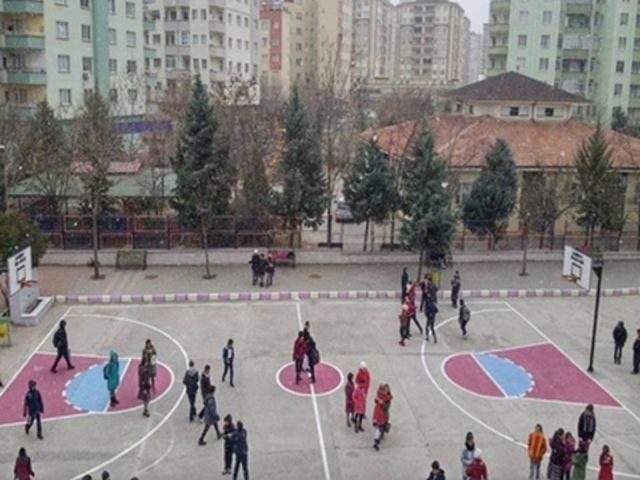
Kaunas St. Francis Gymnasium
Kaunas St. Francis Gymnasium is located in the heart of Lithuania in Kaunas city that is the second biggest city according to the number of people. Kaunas is situated along the two longest rivers in Lithuania the Nemunas and the Neris. It is really a beautiful city with its unique and interesting history. Kaunas St. Francis gymnasium is located next to the Botanical Garden in a quiet and peaceful place with over than 500 pupils. From the 4th July our gymnasium became the only ecological gymnasium in Lithuania. The school's curriculum is closely related to environmental issues, problems, conservation of nature, as well as a healthy lifestyle. The particular focus is on science subjects and the usage of ICT technologies, as nowadays they became inevitable part of educational process at schools. As our gymnasium is located next to the Botanical garden, our pupils have many opportunities to have lessons conducted in other environments, moreover, with the help of various technologies they perform lots of different projects related to environment and its conservation. Currently our gymnasium is participating in some national projects such as Globe, STEAM (science, technology, engineering, art and music) and some others. The gymnasium has some fully-equipped computer rooms, the separate class where pupils can use touch pads, each classroom is provided with projectors that are effectively used during lessons. There are 56 qualified teachers in the gymnasium who teach pupils from 7-19 years old. Teachers try to apply innovative and motivated teaching methods in order to organize teaching process in an interesting and creative way. The main goals of our gymnasium are the following: high quality of teaching/learning and application of active methods within curriculum, promotion of a healthy lifestyle including the whole gymnasium’s community into the process, (nutrition, active and sporty lifestyle, ecological environment), non-traditional teaching environment, education of responsible, mature and opened minded personality.
Andzelika Andreikeniene, Erasmus+ school coordinator, President Valdas Adamkus gymnasium Kaunas
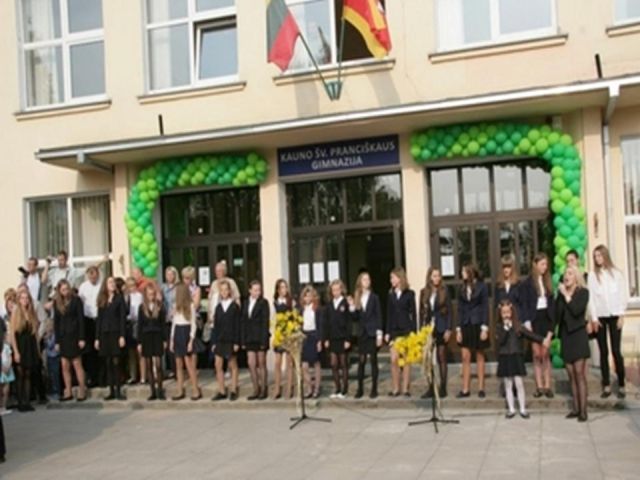
Kauno Šv. Pranciškaus Gimnazija
Kauno Šv. Pranciškaus Gimnazija yra įsikūrusi Lietuvos širdyje – Kaune, antrame pagal dydį mieste pagal gyventojų skaičių. Kaunas yra šalia dviejų ilgiausių Lietuvos upių – Nemuno ir Neries. Tai išties gražus miestas, turintis savitą ir įdomią istoriją. Kauno Šv. Pranciškaus gimnazija yra ramioje vietoje šalia Botanikos sodo ir turi daugiau nei 500 moksleivių. Nuo liepos 4 d. mūsų gimnazija tapo vienintelė ekologiška gimnazija Lietuvoje. Mokyklos mokymo programa yra glaudžiai susijusi su aplinkosaugos klausimais, problemomis bei sveiku gyvenimo būdu. Ypatingas dėmesys skiriamas mokslo dalykams bei kompiuterių technologijų naudojimui, nes pastaruoju metu jos tapo neišvengiama ugdymo proceso mokyklose dalis. Kadangi mūsų gimnazija yra šalia Botanikos sodo, yra daug galimybių vesti pamokas kitokioje aplinkoje; dėl įvairių technologijų moksleiviai atlieka daug projektų, susijusių su aplinka ir jos išsaugojimu. Šiuo metu mūsų gimnazija dalyvauja keliuose šalies projektuose, pvz., „Globe“, ,,STEAM“ (mokslo, technologijų, inžinerijos, meno ir muzikos) ir kai kuriuose kituose. Gimnazija turi keletą visiškai įrengtų kompiuterių kabinetų, atskirą klasę, kurioje mokiniai gali naudoti jutiklines aikšteles; kiekvienoje klasėje yra projektoriai, veiksmingai naudojami pamokų metu. Gimnazijoje yra 56 kvalifikuoti mokytojai, dėstantys 7–19 metų moksleiviams. Mokytojai taiko inovatyvius ir motyvuotus mokymo metodus, siekdami įdomiai ir kūrybiškai organizuoti mokymo procesą. Pagrindiniai mūsų gimnazijos tikslai yra aukšta mokymo / mokymosi kokybė ir aktyvių metodų taikymas mokymo programose, sveiko gyvenimo būdo skatinimas, į šį procesą įtraukiant visą gimnazijos bendruomenę (mityba, aktyvus ir sportiškas gyvenimo būdas, ekologiška aplinka), netradicinė mokymo aplinka, atsakingos, brandžios ir atviros asmenybės ugdymas.
Rita Rasikiene, mokyklos direktorius, President Valdas Adamkus gymnasium Kaunas
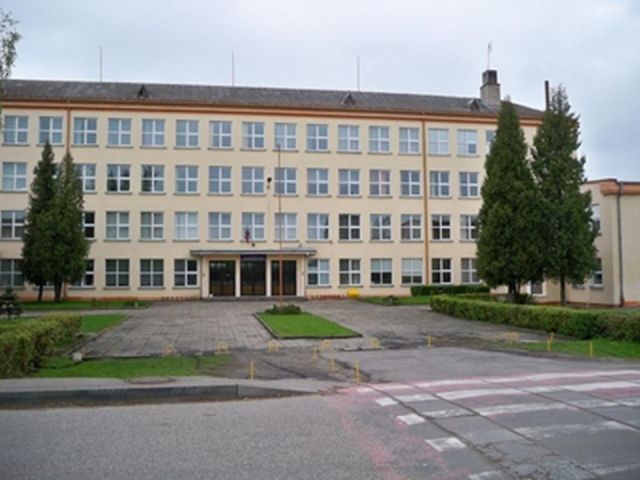
“Constantin Noica” High School
“Constantin Noica” High School is a public pre-university educational institution, subordinated to the Ministry of National Education and Scientific Research through the Sibiu County School Inspectorate. It develops its activity in buildings belonging to the local public domain Sibiu City and it is managed and financed by the Municipality of Sibiu City.The educational levels in our high school are: primary (from the preparatory class to the 4th class), gymnasium classes (V-VIII), high school classes (IX-XII) and post high school (I-III). The education in our institution is a general and vocational one, with three profiles (real, humanist, theological) and five specializations (Mathematics-Computer Science, Natural Sciences, English Intensively with 3-4 hours per week for the 4th and 6th gymnasium classes, Philology, Baptist Theology).The educational offer included: sporting and academic activities/subjects in the school curriculum; extracurricular activities for the formation of advanced language and IT skills and supporting the high performance; extracurricular activities - cultural, artistic, sport and leisure contests and competitions, etc. Under the name Liceul Teoretic “Constantin Noica”, were unified since 2011 the following educational institutions from Sibiu City. "Constantin Noica" High School, located then on Hill Street No. 6 (which debuted as instructional institution of the Catholic confessional education and whose fame is well known worldwide and which functioned later as a sisters school of care, under the tutorship of Red Cross and subordinated to the Ministry of Health), "Mihai Eminescu" General School No. 9 (which received with honor the name of our national poet Mihai Eminescu, in the spirit of the Romanian tradition for cultivating in the pupils’ mind and soul their love for language, literature and culture), located on Army Street No. 5 and "Bethany" Baptist High School. Now, the high school is located in the building of the former general school above mentioned, built on a place sanctified by the blood sacrifice of those who fought for the unification of the three Romanian Principalities under the spectrum of the ruler Michael the Brave. The enrolment of pupils has from this year a new educational offer, starting from our certitude that a good cooperation between school and family is possible only when the family understands well the mission of the school, and the school considers the family as an ally, honest, permanent collaborator, directly interested in the educational process. We have in our new offer: a program for preparing of homework in school (the program “School after school”) with the opportunity to provide pupils a hot meal, at the request of parents (dining room); additional preparation for pupils in terminal classes, ensuring the school success; program of support for pupils with special educational needs (SEN); studying of foreign languages: English, German, French; foreign language through songs, games and poetry (English, German, French), Computer Science, Health Education, Environmental Education as optional school subjects; Ecotourism, Introduction to Journalism collaborating with the Children’s Palace from Sibiu City as extracurricular activities; the possibility of asserting for pupils with creative potential in the school magazine “Amalgam”; assistance given to pupils and parents through the counseling of family with the participation of the school psychologist; the monitoring of the grades and absences using the electronic class-book. The material basis of our school consists of: classrooms which are specifically arranged for the preparatory classes, equipped with furniture and material means; sanitary toilets with equipments appropriate to pupils’ age; a Computer Science classroom with Pentium computers, connected in network and with internet; a Computer Science classroom AEL with educational software programs; classrooms on school subjects (Biology, Modern Languages, History, Geography, Romanian Language, Physics and Chemistry); a school library with over 22,000 volumes, with a reading room and a projection room; a modern gym hall with an area of 800 square meters; another gym hall with fitness equipment; 2 medical offices (pediatrics and dentistry); an office for psychological counseling; an own thermal central and rehabilitated heating. In our well equipped Computer Science classrooms, the pupils of the last high school class (XII) sustain both the digital competences testing (D) and that of linguistic competences (C) within their baccalaureate exam, according to the calendar established yearly by the Ministry of National Education and Scientific Research, in days of the July month. The school leadership sustains all projects developed by us, proud to promote our school in country and abroad. In an Erasmus+ project we will show to our European partners what nice activities accomplish our pupils, guided by their teachers. Among the representative achievements of “Constantin Noica” High School we mention: the organizing of the annual study camp in Paltinis and Sadu for the pupils with outstanding results; the first prize for the national project “From the Music of Nature to the Music of Psyche”, included in the Calendar of the National Educative Activities for the year 2010; the second prize in the county contest for school publications with “Amalgam” school magazine, in which we published a lot of articles about the protection of the environment; the organizing of German and Romanian folk dances and even the receiving of the first prize for the German dances played by the pupils of our high school at the County Folklore Festival which held in Avrig Town, and the third prize for the Romanian folk dances; the first prize in the County Contest (2011) and in the National Competition (2012) for the project "Our City Is in Our Hands", achieved with the involvement of our pupils' parents, another reason to prove that we have expertise and will be able to show to our Erasmus+ project partners how we contribute in creating a clean atmosphere in our city; the first prize at the International Symposium “The Fairy Tales of the Peoples - A Travel around Europe” for the sketch acted by our gifted pupils, ready to show to this project partners they are open for learning more knowledge about the world culture; the participation of our pupils in contests on different subjects, especially of Computer Science, and sport competitions with good results, a fact which determines us to state that our pupils will include successfully the digital citizenship with all its rights, norms, responsibilities and freedoms in our project activities and learning events. In the context of continuing the reform in the pre-university education from Romania, our school, through the activity of our school leadership and teachers, members in our former Comenius project or future members in this Erasmus+ project will consider to prove that they are the best partners the next priority objectives: the pupil-centered learning; the assurance of quality; the information system; the modernization of the material base in our school; the educational management; equal opportunities for all our pupils; the use of ICT in teaching, as well as in developing projects; the pupils with special needs; the European integration; the development of the material base for the differentiated training. The key persons involved in this project know how to work in ecological activities and how to imply pupils of all cycles and material possibilities. They proved this in what we call “School after school”, a program for young pupils consisting in a service brought to the community, without substituting the family, but helping parents who are involved in the implementation of the program. The activity we carried out in this program for the young pupils is an educational addition of institutional type, subsumed to the formal education, in a in a completing relation with the formal education. These services are for the benefit of children aged 6-10, coming from families who do not have in the care of whom to leave their children after the daily school program, who want for their children an alternative of being supervised by a personnel with special training, in a group setting that can boost their ability of interpersonal relationship with those of the same age but also with those of different ages. Our school is a tolerant, open institution, which offers equal opportunities to education and culture for all pupils. The educational activities carried out in this respect under the supervision of specialized staff consist of: the reintegration of the children into the daily schedule, the help with homework for the following day and the further ones, the organizing of the wakefulness states, offering games and toys appropriate to age, facilitating interpersonal relationships between children, directing the individual and collective game in the atmosphere of a stimulating communication, health monitoring, administering food, the compliance as far as possible of preferences for food and toys, the achievement of the personal hygiene. There are a lot of teachers in our school with experience in projects, among them mentioning the headmaster, who has experience in POSDRU projects, the coordinator of the Romanian school and of this whole Erasmus project, who has experience in many eTwinning projects for whom received along the years National and European Quality Labels and other teachers in our Erasmus+ project team, who attended the E-mentor course for the developing of ICT competences and skills and educational mentoring of the persons with disabilities within a project of “Lucian Blaga” University of Sibiu, trainings in environmental sustainability at Teacher Training House Sibiu, workshops or symposiums related to climate change and global warming, actions in the recycling program of the school, etc.
Gabriela Mirela Jugar, ELIT project coordinator, "Constantin Noica" Theoretical High School Sibiu
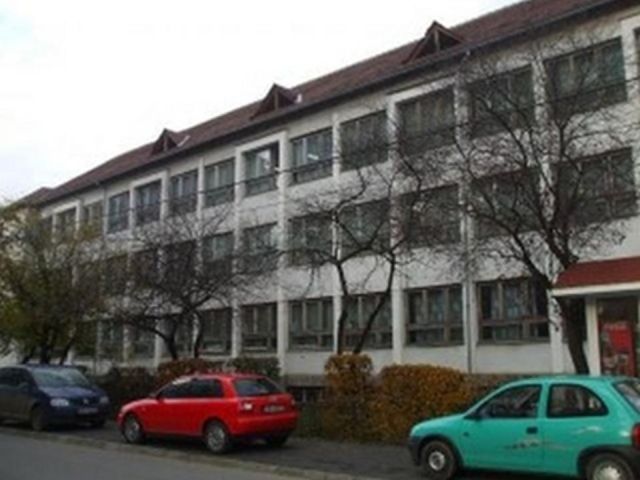
Liceul "Constantin Noica" Sibiu
Liceul "Constantin Noica" este o instituție publică de învățământ preuniversitar, în subordinea Ministerului Educației Naționale și a Cercetării Științifice prin Inspectoratul Școlar Județean Sibiu. Ea își desfășoară activitatea în clădiri aparținând domeniului public Sibiu local și este gestionat și finanțat de către Municipalitatea orașului Sibiu. Nivelurile de învățământ din liceul nostru sunt: primar (de la clasa pregătitoare la clasa a 4-a), clasele de gimnaziu (V-VIII), clasele de liceu (IX-XII) și post-liceale (I-III). Educația în instituția noastră este una generală și vocațională, cu trei profiluri (real, umanist, teologic) și cinci specializări (Matematică-Informatică, Științe Naturale, Engleza cu 3-4 ore intensiv pe săptămână, pentru clasele a 4-a și a 6-a de gimnaziu, Filologie, Teologie Baptistă). Oferta educațională a inclus: activități/discipline academice și sportive în cadrul curriculumului la decizia școlii; activități extracurriculare pentru formarea unor competențe avansate lingvistice și IT și susținerea performanței înalte; activități extrașcolare - concursuri și competiții, activități culturale, artistice, sportive și recreative etc. Sub denumirea de Liceul Teoretic “Constantin Noica”, din anul 2010 se reîntregesc următoarele instituţii de învăţămănt: Liceul Teoretic „Constantin Noica” situat atunci pe strada Dealului nr.6, Sibiu (care a debutat ca instituţie instrucţionala în formula învatamântului confesional, catolic, a cărui faima e bine cunoscută în întreaga lume și care a funcționat mai târziu ca o școală de surori medicale/de caritate, sub tutela Crucii Roșii și în subordinea Ministerului Sănătății), Școala Generală "Mihai Eminescu" No. 9 (care a primit cu cinste numele poetului nostru național Mihai Eminescu, în spiritul tradiției românești pentru cultivarea în mintea și sufletul elevilor a dragostei lor pentru limbă, literatură și cultură), situată pe strada Armatei No. 5 și Liceul Baptist "Betania". Acum, liceul este situat în clădirea fostei școli generale menționate mai sus, construită pe un loc sfinţit prin jertfa de sânge a celor care au luptat pentru unificarea celor trei Principate Române sub spectrul Voievodului Mihai Viteazul. Înscrierea elevilor are din acest an o nouă ofertă educațională, pornind de la certitudinea noastră că o bună colaborare între şcoală şi familie este posibilă numai atunci când familia înţelege bine menirea şcolii, iar şcoala consideră familia ca un aliat, un colaborator sincer, permanent, direct interesat de procesul instructiv-educativ. Avem în noua noastră ofertă: un program de pregătire a temelor în şcoală (programul „Şcoală după şcoală”) cu posibilitatea de a asigura elevilor o masă caldă, la solicitarea părinților (sală de mese); pregătire suplimentară pentru elevii claselor terminale, asigurând succesul şcolar; program de sprijin pentru elevii cu nevoi educative speciale (CES); studierea limbilor străine: engleză, germană, franceză; limbă străină prin cântece, jocuri și poezie (engleză, germană, franceză), Informatică, Educație pentru Sănătate, Educație pentru mediu ca și discipline școlare opționale; Ecoturism, Iniţiere în Jurnalism în colaborare cu Palatul Copiilo, ca activități extracurriculare; posibilitatea afirmării elevilor cu potențial creator în revista şcolară ,,Amalgam”; asistența acordată elevilor şi părinţilor prin consilierea familiei cu participarea psihologului şcolar; monitorizarea notelor și absențele folosind catalogului electronic. Baza materială a școlii noastre este formată din: săli de clasă, care sunt special amenajate pentru clasele pregătitoare, dotate cu mobilier şi mijloacele materiale necesare; grupuri sanitare cu obiecte sanitare adecvate vârstei elevilor; un cabinet de informatică cu calculatoare Pentium, legate în retea şi cu internet; un cabinet de informatica AEL cu programe de soft educational; cabinete pe discipline de învăţământ (biologie, limbi moderne, istorie, geografie, limba română, fizică şi chimie); o bibliotecă cu peste 22000 de volume, cu sală de lectură şi sală de proiecţie; o sală modernă de sport cu o suprafață de 800 mp; o altă sală de gimnastică cu aparate fitness; 2 cabinete medicale: pediatrie şi stomatologie; un cabinet pentru consiliere psihologică; o centrală termică proprie şi încălzire reabilitată. În bine echipatele noastre cabinete de Informatică, elevii din ultima clasă de liceu (clasa a XII-a) susțin atât testarea competențelor digitale (D) și cea a competențelor lingvistice (C) din cadrul examenului lor de bacalaureat, potrivit calendarului stabilit anual de către Ministerul Educației Naționale și a Cercetării Științifice, în zile ale lunii iulie. Conducerea școlii susține toate proiectele derulate de noi, mândră de a promova școala noastră în țară și în străinătate. Într-un proiect Erasmus + vom arăta partenerilor noștri europeni ce activități frumoase realizează elevii noștri, îndrumați de profesorii lor. Printre realizările reprezentative ale Liceului "Constantin Noica" menționăm: organizarea taberei de studiu anuale de la Păltiniș și Sadu pentru elevii cu rezultate deosebite; premiul întâi pentru proiectul național "De la muzica naturii la muzica lui Psyche", inclus în Calendarul Activităților Educative Naționale pentru anul 2010; premiul al doilea la concursul județean de publicații școlare cu revista școlii "Amalgam", în care noi am publicat multe articole despre protecția mediului înconjurător; organizarea de dansuri populare germane și românești și chiar primirea premiului întâi pentru dansuri germane jucate de elevii liceului nostru la Festivalul Folcloric Județean, care a avut loc în orașul Avrig, și premiul al treilea pentru dansuri populare românești; premiul întâi la Concursul Județean (2011) și la Concursul Național (2012) pentru proiectul "Orașul nostru este în mâinile noastre", realizat cu implicarea părinților elevilor noștri, un alt motiv pentru a dovedi că avem expertiză și vom fi în măsură să demonstrăm partenerilor noștri de proiect Erasmus + modul în care contribuim la crearea unei atmosfere curate în orașul nostru; premiul I la Simpozionul Internațional "Basmele popoarelor - Călătorie prin Europa" pentru sceneta interpretată de elevii noștri talentați, gata să le arate partenerilor din acest proiect că ei sunt deschiși pentru a învăța mai multe cunoștințe despre cultura mondială; participarea elevilor noștri în concursuri la diferite discipline școlare, în special de Informatică, și competiții sportive, cu rezultate bune, fapt ce ne determină să afirmăm că elevii noștri vor include cu succes cetățenia digitală cu toate drepturile, normele, responsabilitățile și libertățile ei în activitățile noastre de proiect și în evenimente de învățare. În contextul continuării reformei în învățământul preuniversitar din România, școala noastră, prin activitatea conducerii școlii noastre și profesorii, membri ai fostului nostru proiect Comenius sau viitorii membri în acest proiect Erasmus + vor lua în considerare, pentru a dovedi că ei sunt cei mai buni parteneri, următoarele obiective prioritare și anume: învățarea centrată pe elev; asigurarea calității; sistemul de informare; modernizarea bazei materiale în școala noastră; managementului educațional; oportunitățile egale pentru toți elevii noștri; utilizarea TIC în procesul de predare, precum și în dezvoltarea de proiecte; elevii cu nevoi speciale; integrarea europeană; dezvoltarea bazei materiale pentru instruirea diferențiată. Persoanele cheie implicate în acest proiect știu cum să lucreze în activități ecologice și cum să implice elevii din toate ciclurile și cu orice posibilități materiale. Ei au demonstrat acest lucru în ceea ce noi numim „Școală după școală”, un program pentru elevi mai mici care constă într-un serviciu adus comunității, fără a înlocui familia, dar ajutând părinții care sunt implicați în punerea în aplicare a programului. Activitatea pe care am realizat-o în acest program pentru elevii mai mici este un adaos educaţional de tip instituţional, subsumat educaţiei nonformale, aflată în raport de complementaritate cu educaţia formală. De aceste servicii beneficiază copiii cu vârste cuprinse între 6 şi 10 ani, proveniţi din familii ce nu au în grija cui să lase copiii după terminarea programului zilnic şcolar, care vor pentru copiii lor o alternativă de a fi supravegheaţi de personal cu pregătire specială, într-un cadru de grup care poate stimula capacitatea lor de relaţionare interpersonală cu cei de aceeaşi vârstă dar şi cu vârste diferite. Şcoala noastră este o şcoală tolerantă, deschisă care oferă şanse egale la educaţie şi cultură pentru toţi elevii. Activităţile educative realizate în acest sens sub coordonarea cadrelor specializate constau în: integrarea copilului în programul zilnic, ajutor la efectuarea temelor pentru a doua zi şi a celor suplimentare, organizarea stării de veghe, oferirea de jocuri şi jucării corespunzătoare vârstei, facilitarea relaţiilor interpersonale dintre copii, dirijarea jocului individual şi colectiv în atmosfera de comunicare stimulativă, supravegherea stării de sănătate, administrarea hranei, respectarea pe cât posibil a unor preferinţe pentru alimente şi jucării, realizarea igienei personale. Există o mulțime de profesori în școala noastră cu experiență în proiecte, printre ei menționând directorul școlii, care are experiență în proiecte POSDRU, coordonatorul școlii române și a întregului acest proiect Erasmus, care are o experiență în mai multe proiecte eTwinning pentru care a primit de-a lungul anilor Certificate Naționale și Europene de Calitate și alți profesori din echipa nproiectului nostru Erasmus +, care au participat la cursul de e-mentor pentru dezvoltarea de competențe și abilități TIC și îndrumarea educațională a persoanelor cu dizabilități în cadrul unui proiect al Universității „Lucian Blaga" din Sibiu, la formări în dezvoltarea durabilă a mediului la Casa Corpului Didactic Sibiu, la ateliere sau simpozioane pe tema schimbărilor climatice și încălzirii globale, la acțiuni din cadrul programului de reciclare al școlii, etc.
Mihai Victorin Ordean, director Liceul Teoretic "Constantin Noica" Sibiu
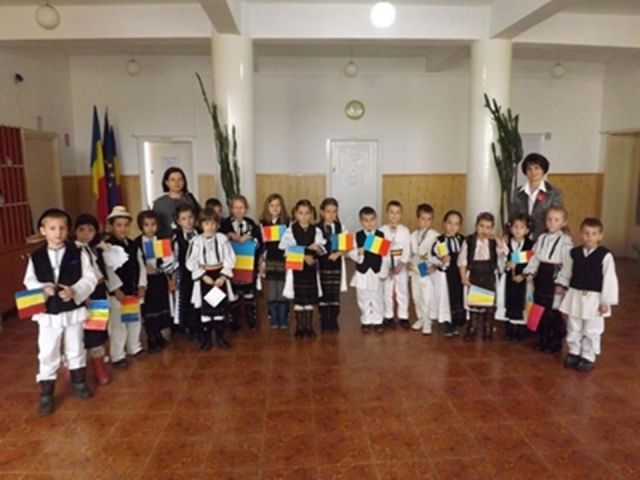
Gymnasium Apostolou Paulou in Paphos
Gymnasium Apostolou Paulou is the biggest public school in Cyprus for pupils of 12-15 years old. It is founded in 1995 and it is based on a centralized education model. It is near the church Apostolos Pavlos in Paphos city which it derives its name. During the academic year 20015/2016, 628 pupils were registered. The pupils are divided into 23 classes, 7 classes of the first level, 8 classes of the second level and 8 classes of the third level. All the subjects are compulsory. The school year runs from September 10 to May 20. Pupils attend classes Monday through Friday, from 7:30 am to 1:35 pm. Breaks occur at 9:00 am for 15 minutes, at 10:45 am for 25 minutes and at 12:40 pm for 10 minutes. Periods are 45 minutes in length and pupils have 35 periods each week. The uniform consists of gray trousers or jeans for boys, gray skirts or jeans for girls and white, black or gray T-shirts. The school does not charge tuition fees and textbooks are provided for free to all pupils like all the public schools in Cyprus controlled by the government. The Gymnasium represents an independent separate course of studies of general education, focused on humanistic education. It accomplishes general education provided by primary school and prepares pupils for lyceum or technical/professional education. Courses are common for all pupils. Under the policy of the Ministry of Education and Culture for qualitative improvement of provided education, new institutions concerning high school have been introduced and promoted, like for example the teaching of computers in all classes, the use of the library, the introduction of the institution of special classrooms, such as Language and history rooms, as well as upgrading the institution concerning the Head teacher of a class. All subjects are taught in the classrooms except of those which require laboratories: laboratories of Chemistry, Biology and Physics; Computer classrooms; Language room; Art and Music classroom and Home Economy classroom. There are 75 teachers. A large number of teachers work permanently and the rest move from one school to the other. Teachers with 10 years of experience work 24 hours per week. The Gymnasium is involved in bullying programs in order to prevent fight and violence at school. It is also very active in environmental activities with the goal to help pupils incorporate environmental ideals into their daily life. The pupils are actively involved in the recycling, renewable energy and tree plantation programs. Gymnasium Apostolou Paulou takes measures for the education of children with special needs. Special education and generally the required help concerning school development are taken for pupils with severe learning, functional and adaptive difficulties in all sectors, and particularly in the psychological, social, and educational sectors. Activities and experience of partner organization: teacher meetings and trainings in environmental sustainability to develop fresh ideas and provide practical guidance for teachers and built environment professionals; regular exploration visits and trips of pupils to wastewater treatment and recycling plants, wind and solar farms, ecological parks, etc.; regular workshops in classrooms of English language and art related to climate change and global warming; involve pupils in the recycling program of the school by training them how to use the recycling bins. The skills and/or expertise of key persons are: Geography, biologists and Information technology background; creative and innovative ways of learning, develop social, digital and long life learning competence; climate change, global warming, recycling, renewable energy; Smart Grid, heating and cooling, innovation technologies, energy storage; implement international projects into educational process; social media and informative technology tools in education.
Demetris Symeonides, Erasmus+ school coordinator, Gymnasium Apostolou Paulou in Paphos
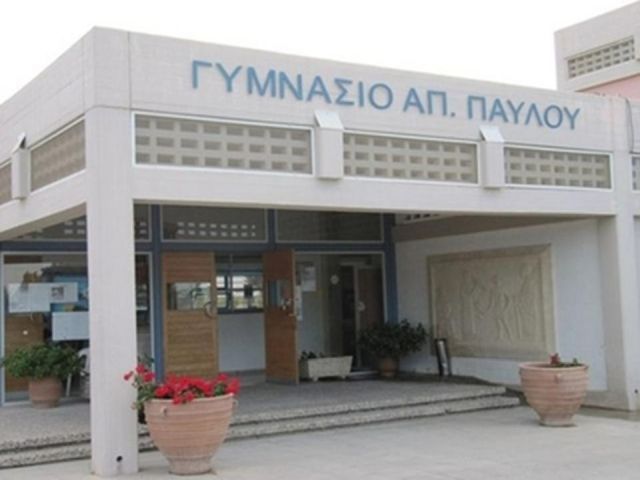
Το Γυμνάσιο Αποστόλου Παύλου στην Πάφο
Το Γυμνάσιο Αποστόλου Παύλου είναι το μεγαλύτερο δημόσιο σχολείο στην Κύπρο για μαθητές 12-15 χρονών. Ιδρύθηκε το 1995 και βασίζεται σε ένα συγκεντρωτικό μοντέλο εκπαίδευσης. Βρίσκεται κοντά στην εκκλησία του Αποστόλου Παύλου στην Πάφο από την οποία πήρε και το όνομά του. Κατά τη διάρκεια του ακαδημαϊκού έτους 2015/2016, ήταν εγγεγραμμένοι 628 μαθητές. Οι μαθητές χωρίζονται σε 23 τμήματα, 7 τμήματα Α τάξης, 8 τμήματα Β τάξης και 8 τμήματα Γ τάξης. Όλα τα μαθήματα είναι υποχρεωτικά. Το σχολικό έτος διαρκεί από τις 10 Σεπτεμβρίου έως τις 20 Μαΐου. Οι μαθητές παρακολουθούν μαθήματα από Δευτέρα έως Παρασκευή, από τις 7:30 π.μ. μέχρι τις 13.35μ.μ. Διαλείμματα έχουν στις 9:00 για 15 λεπτά, στις 10:45 για 25 λεπτά και στις 12:40 για 10 λεπτά. Οι διδακτικές περίοδοι έχουν διάρκεια 45 λεπτών και οι μαθητές έχουν 35 διδακτικές περιόδους κάθε εβδομάδα. Η στολή αποτελείται από γκρι παντελόνι ή τζιν για αγόρια, γκρι φούστες ή τζιν για τα κορίτσια και άσπρο, μαύρο ή γκρι T-shirt. Το σχολείο δεν χρεώνει δίδακτρα ενώ τα σχολικά βιβλία παρέχονται δωρεάν σε όλους τους μαθητές όπως σε όλα τα δημόσια σχολεία της Κύπρου. Το Γυμνάσιο αποτελεί μια ανεξάρτητη ξεχωριστή διάρκεια σπουδών της γενικής εκπαίδευσης, επικεντρωμένο στην ανθρωπιστική παιδεία. Συμπληρώνει τη γενική εκπαίδευση που παρέχεται από το δημοτικό σχολείο και προετοιμάζει τους μαθητές για τα Λύκεια ή τη Τεχνική/επαγγελματική εκπαίδευση. Τα μαθήματα είναι κοινά για όλους τους μαθητές. Στο πλαίσιο της πολιτικής του Υπουργείου Παιδείας και Πολιτισμού για ποιοτική βελτίωση της παρεχόμενης εκπαίδευσης, έχουν εισαχθεί και προωθηθεί νέες πολιτικές στα Γυμνάσια, όπως για παράδειγμα η διδασκαλία των Ηλεκτρονικών Υπολογιστών σε όλες τις τάξεις, η χρήση της βιβλιοθήκης, η εισαγωγή του θεσμού των ειδικών αιθουσών, όπως οι Αίθουσες Γλωσσών και Ιστορίας, καθώς και η αναβάθμιση του θεσμού του υπεύθυνου τμήματος. Όλα τα μαθήματα διδάσκονται στις τάξεις εκτός εκείνων που απαιτούν ειδικές αίθουσες: εργαστήρια Χημείας, Βιολογίας και Φυσικής, εργαστήρια Υπολογιστών, αίθουσες Ξένων Γλωσσών, αίθουσες Τέχνης και Μουσικής, εργαστήρια Οικιακής Οικονομίας. Εργάζονται 75 εκπαιδευτικοί. Ένας μεγάλος αριθμός εκπαιδευτικών εργάζονται μόνιμα ενώ οι υπόλοιποι εργάζονται και σε άλλα σχολεία. Οι εκπαιδευτικοί ως 10 χρόνια εμπειρίας διδάσκουν 24 περιόδους την εβδομάδα. Το Γυμνάσιο συμμετέχει σε προγράμματα αποτροπής του εκφοβισμού, προκειμένου να αποφευχθεί η βία στο σχολείο. Είναι επίσης πολύ ενεργό σε περιβαλλοντικές δραστηριότητες με στόχο να βοηθήσει τους μαθητές να ενσωματώσουν περιβαλλοντικά ιδεώδη στην καθημερινή τους ζωή. Οι μαθητές συμμετέχουν ενεργά σε προγράμματα ανακύκλωσης, ανανεώσιμών πηγών ενέργειας και δενδροφύτευσης. Το Γυμνάσιο Αποστόλου Παύλου λαμβάνει μέτρα για την εκπαίδευση των παιδιών με ειδικές ανάγκες. Προσφέρει ειδική εκπαίδευση και την απαιτούμενη βοήθεια σε μαθητές με σοβαρές μαθησιακές, λειτουργικές και προσαρμοστικές δυσκολίες σε όλους τους τομείς και ιδιαίτερα στους ψυχολογικούς, κοινωνικούς, και εκπαιδευτικούς τομείς. Δραστηριότητες και εμπειρία του σχολείου μας: συναντήσεις εκπαιδευτικών και εκπαίδευση τους σε περιβαλλοντικά θέματα για παραγωγή νέων ιδεών και παροχή βοήθειας σε περιβαλλοντικα θέματα, ερευνητικές επισκέψεις και ταξίδια μαθητών σε εργοστάσια επεξεργασίας λυμάτων και μονάδες ανακύκλωσης, σε αιολικές και ηλιακές μονάδες, οικολογικά πάρκα, κλπ, εργαστήρια κατά τη διάρκεια των μαθημάτων της αγγλικής γλώσσας και της τέχνης σχετικά με την αλλαγή του κλίματος και την υπερθέρμανση του πλανήτη, συμμετοχή των μαθητών στο πρόγραμμα ανακύκλωσης του σχολείου και κατάρτισή τους για το πως να χρησιμοποιούν τους κάδους ανακύκλωσης. Οι δεξιότητες ή/και η εμπειρία των πρόσωπα που συμμετέχουν στο πρόγραμμα είναι: γεωγραφία, βιολογία και δεξιότητες χρήσης της τεχνολογίας και της πληροφορικής, δημιουργικοί και καινοτόμοι τρόποι μάθησης, ανάπτυξη κοινωνικών, ψηφιακών και δεξιοτήτων δια βίου μάθησης, εκπαίδευση για τις κλιματικές αλλαγές, την υπερθέρμανση του πλανήτη, την ανακύκλωση, τις ανανεώσιμες πηγές ενέργειας, καινοτόμες ιδέες για θέρμανση και ψύξη, καινοτόμες τεχνολογίες, αποθήκευση ενέργειας, εφαρμογή των διεθνών έργων στην εκπαιδευτική διαδικασία, κοινωνικά δίκτυα και εργαλεία πληροφορικής στην εκπαίδευση.
Maria Theofanous-Anthi, διευθυντής σχολείου , Gymnasium Apostolou Paulou in Paphos
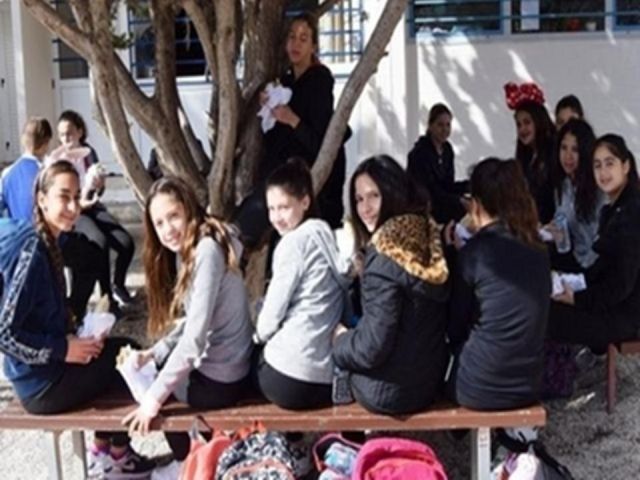
Grouping of Schools Fernando Casimiro Pereira da Silva
Our school is constituted by a group of schools which is an organic unity of public education, including a school population from preschool to secondary school and is the result of the aggregation of four management units; the headquarters are here in our school and the administration for the group, too. As a vertical grouping sequentially, it presents all levels of education and diverse training offer. The school is located in Rio Maior. In this group of schools there are about 1150 pupils and 150 teachers. Agrupamento de Escolas Fernando Casimiro Pereira da Silva is a innovative school. The organization has a staff that usually seeks the change in practices. We are a city school but we have children from the countryside villages in the surroundings. The main school is located in Rio Maior which is a recent town; its roots are in agriculture, industry and livestock. The nearest towns are about 30 km far and we are only 80 km far from our capital, Lisbon. The school is in the center of the town, a neighborhood with very different cultural and socioeconomic levels. It is a public school with 3 key stages (preschool, primary and secondary), pupils from 3 to 15 years old) and with vocational courses, too. We also have 3 classrooms to cater for special needs pupils. ICT has been one of our priorities for the last 6 years, especially in preschool and primary. The school mission is to give the community the best education service that we can provide. We aim at excellence and the education of active citizens aware of their rights and duties, able to act as agents of change, open-minded and in an inclusive environment, a school known for its humanism and high standards of care and responsibility that values knowledge as a condition of access to the world of work and further studies. The school wants to be a local and national reference by the academic and vocational success of their pupils, by the quality of the relationships they create, the high standards they defend and satisfaction from the families they belong. This school mission is the development of a culture of efficient effectiveness to organizational, administrative and educational levels, to promote a culture of evaluation of internal and external control systems including a significant improvement, organizational and administrative level and at the pedagogical level, an effective fight against drop out and school failure; improving the results of our pupils in the finals and external evaluation of the group; improvement in the degree of implementation of the Educational Project and the Annual Activity Plan, seeking to lead the group for the development and autonomy. This is a demanding commitment, which defines an articulated set of objectives, goals and strategies to ensure the smooth and effective functioning of the group and ensure the provision of a public service of quality and excellence. The intervention of the various educational orientation should converge to the continuous improvement of educational outcomes for achieving the goals that are set and later traded to the interaction between the work of the various participants in the educational process and to strengthen the true culture of school, always a learning and reflective school of logic. This project, among others, reinforces the importance of implementing new strategies to improve results in the context of pupil learning integrating knowledge from different areas. Nowadays we are investing in ICT and coding, and we are starting to develop an active classroom lab to improve the use of technology in all curriculum areas.
Paulo Almeida, headmaster, Agrupamento de Escolas Fernando Casimiro Pereira da Silva
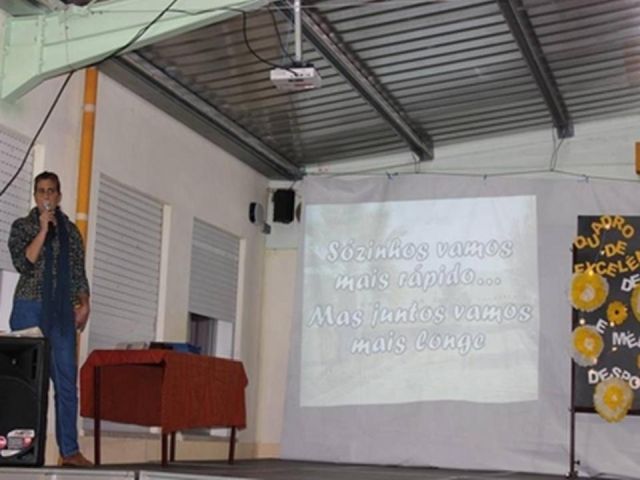
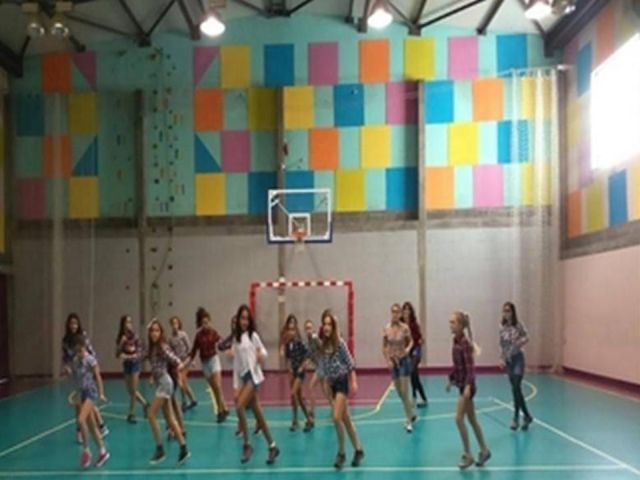
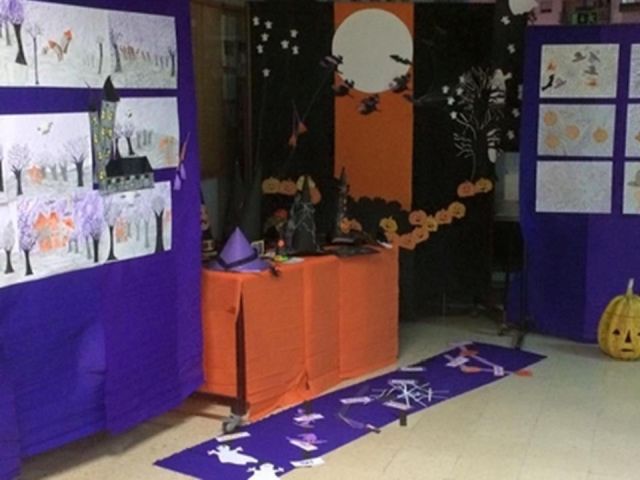
Agrupamento de Escolas Fernando Casimiro Pereira da Silva
Nossa escola é constituída por um grupo de escolas que é uma unidade orgânica da educação pública, incluindo uma população escolar da pré-escola à escola secundária e é o resultado da agregação de quatro unidades de gestão; A sede está aqui em nossa escola e a administração para o grupo, também. Como um agrupamento vertical sequencialmente, apresenta todos os níveis de educação e oferta de formação diversificada. A escola está localizada em Rio Maior. Neste grupo de escolas há cerca de 1150 alunos e 150 professores. Agrupamento de Escolas Fernando Casimiro Pereira da Silva é uma escola inovadora. A organização tem uma equipe que geralmente busca a mudança nas práticas. Somos uma escola da cidade, mas temos crianças das aldeias de campo nos arredores. A escola principal está localizada em Rio Maior que é uma cidade recente; Suas raízes estão na agricultura, indústria e pecuária. As cidades mais próximas estão a cerca de 30 km de distância e estamos a apenas 80 km da nossa capital, Lisboa. A escola está no centro da cidade, um bairro com níveis cultural e socioeconômico muito diferentes. É uma escola pública com 3 estádios-chave (pré-escolar, primário e secundário), alunos de 3 a 15 anos de idade) e com cursos de formação profissional. Temos também 3 salas de aula para atender a alunos com necessidades especiais. As TIC têm sido uma das nossas prioridades nos últimos 6 anos, especialmente na pré-escola e na educação primária. A missão da escola é dar à comunidade o melhor serviço de educação que podemos oferecer. Buscamos a excelência ea educação de cidadãos ativos conscientes de seus direitos e deveres, capazes de atuar como agentes de mudança, de mente aberta e em um ambiente inclusivo, uma escola conhecida por seu humanismo e altos padrões de cuidado e responsabilidade que valoriza o conhecimento Como condição de acesso ao mundo do trabalho e estudos posteriores. A escola pretende ser uma referência local e nacional pelo sucesso académico e profissional dos seus alunos, pela qualidade das relações que criam, pelos elevados padrões que defendem e pela satisfação das famílias a que pertencem. Esta missão escolar é o desenvolvimento de uma cultura de eficácia eficiente aos níveis organizacional, administrativo e educativo, para promover uma cultura de avaliação dos sistemas de controlo interno e externo, incluindo uma melhoria significativa, nível organizacional e administrativo e ao nível pedagógico, uma luta eficaz Contra abandono escolar e fracasso escolar; Melhorar os resultados dos nossos alunos nas finais e avaliação externa do grupo; Melhoria do grau de implementação do Projeto Educacional e do Plano Anual de Atividades, buscando liderar o grupo para o desenvolvimento e autonomia. Trata-se de um compromisso exigente, que define um conjunto articulado de objectivos, metas e estratégias para assegurar o bom funcionamento do grupo e assegurar a prestação de um serviço público de qualidade e excelência. A intervenção das diversas orientações educativas deve convergir para a melhoria contínua dos resultados educacionais para a consecução das metas estabelecidas e posteriormente negociadas para a interação entre os trabalhos dos diversos participantes no processo educativo e para fortalecer a verdadeira cultura da escola, sempre Uma escola de lógica e reflexiva. Este projecto, entre outros, reforça a importância da implementação de novas estratégias para melhorar os resultados no contexto da aprendizagem dos alunos, integrando conhecimentos de diferentes áreas. Hoje em dia estamos investindo em TIC e codificação, e estamos começando a desenvolver um laboratório de sala de aula ativo para melhorar o uso da tecnologia em todas as áreas do currículo.
Célia Pereira, professor, Agrupamento de Escolas Fernando Casimiro Pereira da Silva
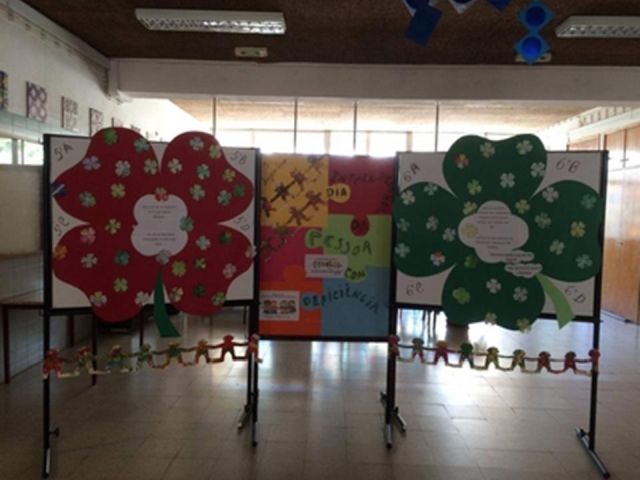
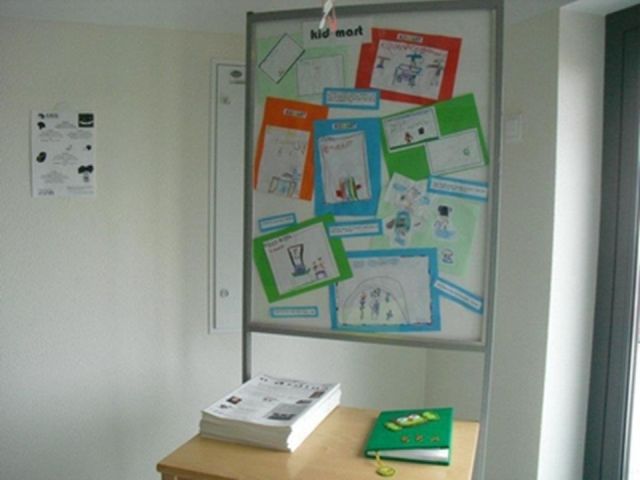
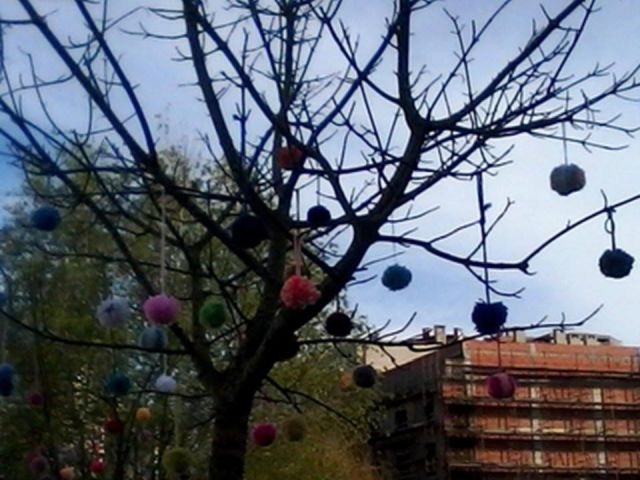
Primary School Cakovec
Our school is a public school with almost 800 pupils at the age of 6 to 14. It is a primary school. It is located in the north-western part of Croatia, near the Slovenian and the Hungarian border. Our school is currently a part of many international projects like “Safety and mobility for all”, “#codeEU”, “TakeIT Global”, “Hour of code”, eTwinning projects, two Erasmus+ KA2 projects, e-school, etc. Our school is well-computer equipped, various programming tools being used in class; our pupils are constantly encouraged to learn how to program and use ready-made software, research, plan and create their own social media and curation applications. Our school has a very good cooperation with Microsoft and Apple; thus, our school has the status of Apple partners in education. Great importance is attached to the mathematics, programming and robotics. The pupils in our school consistently performed great success in competitions in this area, and informatics teacher Ivana Ružić is the EU Code Week ambassador for Croatia. Our teachers and pupils’ works are regularly presented in public, at various regional, state and international conferences, for which the pupils and their mentors have won many awards and acknowledgments. School in its project activities enjoys great organizational and financial support of local authorities, industry and the wider community. As you know, Croatia is now the youngest member of the EU and we are very open to Europe and would like to be more open to new ideas coming from educational staff from all over Europe. Key persons are able: to develop (together with the board members and other teachers) a vision in the projects activity plan on creative and innovative ways of learning, develop social, digital and long life learning competence; to learn partners of the theory and practices concerning new opportunities for teaching and learning through using tablet computers, robots, social media tools, curation tools and latest web2.0 tools to offer potential in their daily practice in the classroom especially in their preparation of the activities that facilitate collaborative learning, research, creativity, assessment, communication, research; to explore independently new ways in which the social media tools, curation tools and latest web2.0 tools and new media can help the learner to develop and self-express; to be able to identify the possible obstacles faced when using a variety of tools in the classroom settings in different educational levels; to create sample lessons that can be completed by pupils using a variety of social media tools, curation tools and latest web2.0 tools; to discuss the relationships among innovation, creativity, traditional education, and standards; to encourage, motivate and assist colleagues in the active, purposeful, responsible and innovative use of technology; to encourage creativity, independence, positive attitude to work; to develop lifelong learning; to develop and implement international projects into educational process; to educate active, responsible, creative and tolerant Europeans; to demolish language barriers, prejudice, state boundaries in acquiring new knowledge, developing skills and abilities of pupils and teachers; to contribute to the overall increase in the quality of education in the community so they will present their experience in various seminars of local, national and international levels. For teachers, we expect an improvement of their foreign language skills in international communication with other colleagues and to understand better cultural and educational contexts in Europe.
Marija Toplek, teacher, l. osnovna skola Cakovec
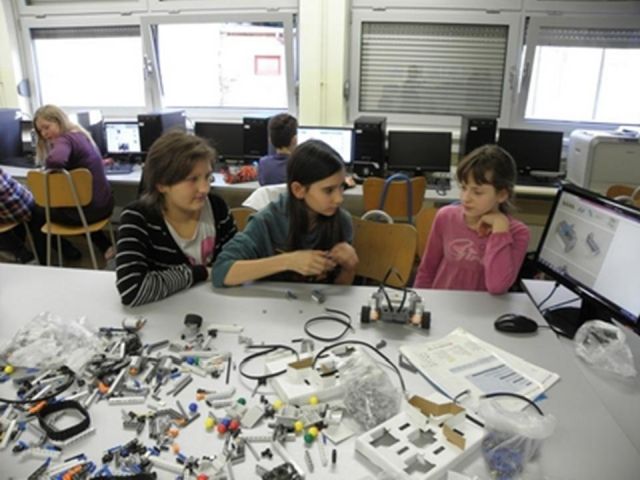
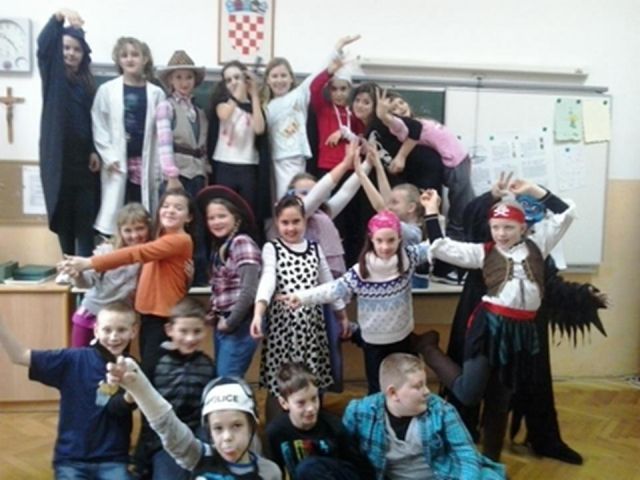
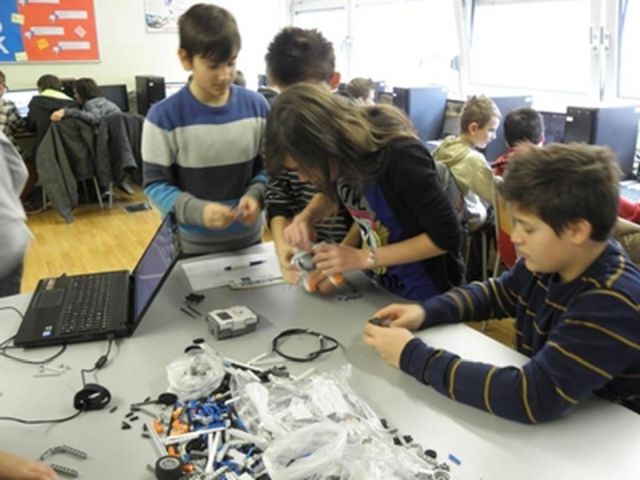
Osnovna skola Cakovec
Naša škola je javna škola s gotovo 800 učenika u dobi od 6 do 14. To je osnovna škola. Ona se nalazi u sjeverozapadnom dijelu Hrvatske, u blizini slovenske i mađarske granice. Naša škola je trenutno dio mnogih međunarodnih projekata kao što su "Sigurnost i mobilnost za sve", "#codeEU", "TakeIT Global", "Sat kodiranja", eTwinning projekti, dva Erasmus+ KA2 projekta, projekt e-škole itd. Naša škola je dobro računalo opremljena, razni programski alati se koriste u nastavi; naši učenici se stalno potiču da uče kako programirati i koristiti gotove aplikacije, istražuju, planiraju i stvaraju vlastite sadržaje, koriste društvene medije i stručne programske aplikacije. Naša škola ima vrlo dobru suradnju s Microsoftom i Appleom; naša škola ima status Apple partnera u obrazovanju. Velika važnost se pridaje matematici, programiranju i robotici. Učenici u našoj školi redovito ostvaruju velike uspjehe u natjecanjima na regionalnoj i državnoj razini, a Ivana Ružić je EU Code Week ambasador Europske komisije za Hrvatsku. Naši nastavnici redovito rad i uspjehe naše škole predstavljaju u javnosti, na raznim regionalnim, državnim i međunarodnim konferencijama, na kojima su učenici i njihovi mentori su osvojili brojne nagrade i priznanja. Škola u svojim projektnim aktivnostima uživa veliku organizacijsku i financijsku potporu lokalnih vlasti, privrede i šire zajednice. Kao što znate, Hrvatska je sada najmlađa članica EU i vrlo smo otvoreni za integraciju u Europu, a željeli bi biti više otvoreni za nove ideje koje dolaze iz nastavnog osoblja iz cijele Europe. Ključne osobe su u stanju razvijati se (zajedno s članovima uprave i drugim nastavnicima) u vidu planiranja i provođenja aktivnosti na kreativan i inovativan načine, razvoj socijalnih, digitalnih kompetencija i kompetencija za cjeloživotno učenje; kako bi usvojili teoriju i praksu vezane uz nove mogućnosti za nastavu i učenje kroz korištenje tablet računala, robota, društvenog softvera, najnovijih web2.0 alata itd., ovaj potencijal koristili u svojoj svakodnevnoj nastavi u razredu osobito u razvoju kolaborativnog učenja, istraživanja, kreativnosti, vrednovanja, komunikacije. Želimo da nove tehnologije mogu pomoći učeniku da razvije samopouzdanje, da učenici odgovorno i svrsishodno koriste tehnologiju, da budu u stanju identificirati moguće prepreke s kojima se suočavaju prilikom korištenja raznih alata u različitim razinama obrazovanja. Želimo stvoriti scenarije učenja koji uključuju aktivno korištenje različitih društvenih medija kako bi razvijali inovativnost, kreativnost, potaknuli, motivirali i pomogli kolegama u aktivnom, svrhovitom, odgovornom i inovativnom korištenju tehnologije; poticali kreativnost, neovisnost, pozitivan odnos prema radu; razvili kompetencijeza cjeloživotno učenje; razvijali i provodili međunarodne projekte u obrazovnom procesu; educirali aktivne, odgovorne, kreativne i tolerantne Europljane; rušili jezične barijere, predrasude, državne granice u stjecanju novih znanja, razvijanje vještina i sposobnosti učenika i nastavnika; pridonijeli ukupnom povećanju kvalitete obrazovanja u zajednici, tako da će predstaviti svoja iskustva na raznim seminarima i konferencijama na lokalnoj, nacionalnoj i međunarodnoj razini. Za učitelje, očekujemo poboljšanje njihovih stranih jezika u međunarodnoj komunikaciji s drugim kolegama i razumjeti bolje kulturne i obrazovne kontekste u Europi.
Sinisa Stricak, ravnatelj škole, l. osnovna skola Cakovec
